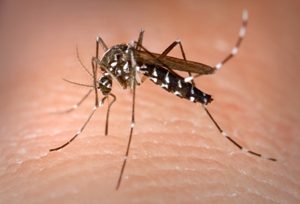
There has been a recent increase in West Nile Virus activity in Indiana, and it is expected that more cases will be identified in the area throughout the rest of the summer and until the first hard frost.
Health Department officials say there are no identified cases of human West Nile Virus infections in Decatur County.
The Decatur County Health Department encourages you to take the following steps to protect you and your family from mosquitoes:
- Avoid being outdoors during prime mosquito-biting times – dusk to dawn – when possible.
- Apply an EPA-registered insect repellent containing DEET, picaridin, IR3535, oil of lemon eucalyptus, or para-methane-diol to clothes and exposed skin.
- Cover exposed skin by wearing a hat, long sleeves, and long pants in places where mosquitoes are especially active, such as wooded areas.
- Treat clothing and outdoor gear with 0.5% permethrin if camping or spending extended periods of time outdoors.
- Make sure all windows and doors have screens, and that all screens are in good repair.
- Reduce mosquito breeding on and around your property.
To reduce mosquito breeding, homeowners can take these actions:
- Get rid of old tires, tin cans, or other containers that can hold water. Even a small bucket that has stagnant water in it for seven days can become home to up to 1,000 mosquitoes.
- Tip bird baths, pet bowls, flowerpots, and other water-holding containers weekly and refill with clean water.
- Repair failed septic systems.
- Keep rain barrels covered with wire mesh smaller than adult mosquitoes.
- Keep grass cut short and shrubbery trimmed.
- Clean roof gutters (roof gutters are easily overlooked but can produce millions of mosquitoes each season).
- Flush ornamental fountains weekly and aerate ornamental pools or stock them with top-feeding minnows.
- Keep swimming pools cleaned and chlorinated.
- Drain and fill stagnant pools, puddles, ditches, or swampy places around the home and property.
Approximately 1 in 5 people who are infected with the West Nile virus will develop symptoms such as fever, headache, body aches, joint pains, vomiting, diarrhea, or rash. Less than 1 percent will develop a serious neurologic illness such as encephalitis or meningitis (inflammation of the brain or surrounding tissues). About 10 percent of people who develop neurologic infections due to the West Nile virus will die. People over 50 years of age and those with certain medical conditions, such as cancer, diabetes, hypertension, kidney disease, and organ transplants, are at greater risk for serious illness.
There are no medications to treat, or vaccines to prevent West Nile virus infection. People with milder illnesses typically recover on their own, although symptoms may last for several weeks. In more severe cases, patients often need to be hospitalized to receive supportive treatment, such as intravenous fluids, pain medication, and nursing care. Anyone who has symptoms that cause concern should contact a health care provider.
You can find more information at in.gov/health/erc/zoonotic-and-vectorborne-epidemiology-entomology/diseases/west-nile-virus/ and cdc.gov/westnile.



